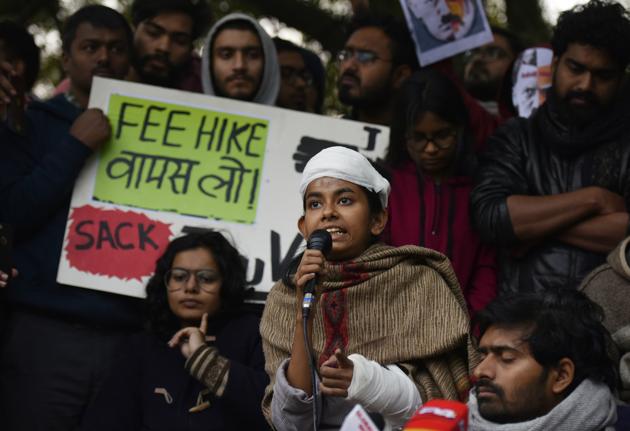Black Sunday: Questions for Delhi Police, JNU VC | Opinion
The police must act against the culprits. Given their possible political affiliation, this requires tough resolve
The mayhem at the Jawaharlal Nehru University (JNU) campus, engineered by a group of masked men on the evening of January 5, has grim portents for the future. It shows the Delhi Police in poor light, and the JNU administration in a state of pathetic ineptitude. It also reflects on the quality of politics played out in university campuses for petty gains.

For over three hours, a group of masked men went around unleashing violence on the campus, terrorising students and teachers alike, while the JNU security and the Delhi Police, deployed around the administration block, remained mute spectators. Amid charges and counter-charges, the police spokesperson, in a press conference, asserted that they responded with alacrity once information about violence inside the campus was received. Operating in a politically surcharged atmosphere, in the wake of the lawyer-police clash, and the action inside the Jamia campus, the Delhi Police top brass have started vacillating even when a legitimate intervention is called for.
A number of questions remained unanswered. How did the masked men enter the campus in which the JNU security commands access control? How did they escape through the main gate again in the presence of the Delhi Police, where, by a strange coincidence, the street lights were not working?
The moot point is that when the campus was going through unrest for the last five days, and the police was duly apprised, what preventive action was taken? A particular group wanted to prolong the agitation against the fee hike, and was forcibly preventing those who wanted to appear for examinations. This group was preventing students from doing online registrations, and even disturbing classes. The situation was clearly getting out of hand, warranting immediate intervention.
The police spokesman said they entered the campus after permission at 7:45 pm, while the FIR clearly says that information was available around 3 pm. Did the police need a certificate to enter when a cognisable offence was being committed inside? The same police entered Jamia in pursuit of miscreants creating trouble on the streets, while in JNU, the goons were right inside, vandalising property and attacking students.
Perhaps the biggest share of the blame can be apportioned to the vice-chancellor (VC) and the administrative officers of JNU, who merely watched from the sidelines. If the students wanted a dialogue, why didn’t the VC involve them in negotiations or explain clearly the inability of the university to undo the fee hike? It would have, then, cleared the way for taking action against those students who were forcing the majority of peaceful students from pursuing their studies.
But VCs today rarely step down from their exalted academic pedestal to soil their hands with the daily grind of administration. They allow things to drift till they come to a boil. As a result, universities today are in a state of disquiet, with myriad issues waiting to be resolved. If only the VC, proctor or dean were persistent enough in calling for timely police intervention on that fateful evening, the appalling incident could have been averted.
The Union education minister stated that JNU is meant to be an educational centre and not a political hub. Unfortunately, in a university where even teachers forge alliances with political parties, it cannot escape from being a political cauldron at times like this. In a politically sensitive environment, it is incumbent upon VCs to act as both counsellors and administrators.
The incident on Black Sunday will leave a deep imprint on the minds of the students and public alike, and cast a long shadow on the role of the police, JNU administration, and political parties.
First, the police has to redeem itself by bringing all the goons involved in the incident to book. Considering they may
be aligned with political groups, it will require tough resolve and determination to pursue the case to its logical conclusion. The police investigation will lay bare the real facts and the people behind the mayhem. Further, the enquiry being conducted by a joint commissioner will reveal the whole background of the case. If the Delhi Police now rises to the occasion, carrying out both these duties, without favour or fear, it will give a clear road map for future interventions in such cases.
Second, JNU students and teachers will have to reflect on the image and future of their institution — as an academic centre of excellence or of political apprenticeship. No university of India ranks in the first 100 in the world — a fact to ponder upon. Shouldn’t there be more debates on improving the quality and content of our academic institutions?
And, last, political parties must stop playing low grade politics on campuses, and stop treating them as breeding grounds for their future players. Even the Mahatma had despaired of the decision of roping students into the freedom movement.






